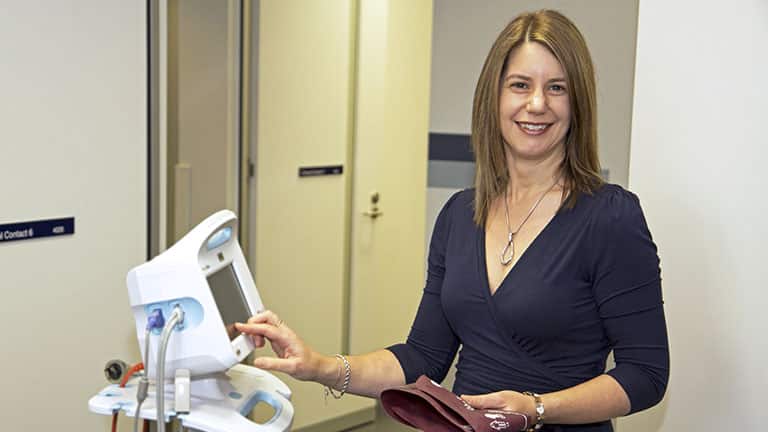
In the face of COVID-19, Professor Coralie English, stroke researcher at the University of Newcastle and HMRI, rapidly pivoted to deliver online resources to support online provision of stroke care and rehabilitation.

In the face of COVID-19, Professor Coralie English, stroke researcher at the University of Newcastle and HMRI, rapidly pivoted to deliver online resources to support online provision of stroke care and rehabilitation.
Building on her work in telehealth, Coralie, the Stroke Foundation and health professionals across the country were able to move rapidly to use the existing platform InformMe – to offer telehealth resources and how-to guides to support clinicians to move rapidly to telehealth methods in response to COVID-19.
“We’ve spent years working with people living with stroke and their carers to develop online solutions to rehabilitation and stroke care, with the aim of delivering telehealth models,” Coralie says. “When COVID-19 started to become a global pandemic, I noticed the call for online methods of rehabilitation and saw an opportunity for us all to work together to deliver solutions for people living with stroke.”
With stroke, time is of the essence, not just in treatment, but in rehabilitation. The crucial time period is the first three to six months after a stroke for optimal rehabilitation. Even in self-isolation, rehab can’t go on hold and it is vital that people with stroke, like all of us, stay as active as possible while at home.
This is where InformMe will help. This platform, hosted by the Stroke Foundation is a dedicated resource for health professionals working in stroke care. In response to COVID-19, the team moved to deliver telehealth resources to assist those in isolation or social distancing.
Coralie chats about the importance of telehealth, and how this pandemic offers an opportunity to reset our expectations and build our capacity to deliver better health solutions online. She can also speak about the new trial she’s working on called i-Rebound, which is exploring online expert support for exercise and diet after stroke.
Listen to Coralie’s chat with ABC Newcastle’s Kia Handley here
HMRI would like to acknowledge the Traditional Custodians of the land on which we work and live, the Awabakal and Worimi peoples, and pay our respects to Elders past and present. We recognise and respect their cultural heritage and beliefs and their continued connection to their land.

Hunter Medical Research Institute
We’re taking healthy further.
Locked Bag 1000
New Lambton
NSW, Australia, 2305



This site is protected by reCAPTCHA and the Google Privacy Policy and Terms of Service apply.
Copyright © 2024 Hunter Medical Research Institute | ABN: 27 081 436 919
Site by Marlin Communications
